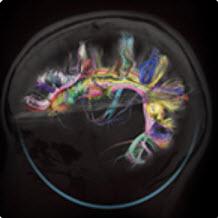
The National Institutes of Health is hosting the Multimodal TMS Speaker Series to bring together the leaders in the field conducting research using non-invasive brain stimulation and functional imaging including EEG and fMRI. The event will be broadcast via web-ex and archived for later viewing.
- Dr. Christian Windischberger will be speaking at 1:30PM
- Dr. Faranak Farzan will be speaking at 2:30PM
- View Eventbrite for more event information
Abstract for Dr. Windischberger:
Transcranial magnetic stimulation (TMS) has become a promising neuroscientific research tool and FDA-approved treatment in major depressive disorder (MDD), yet its neuronal basis is not fully understood. This is mainly due to limitations inherent to typical TMS/fMRI setups, most importantly the poor sensitivity and lack of flexibility using conventional birdcage MR coils. We developed a dedicated multi-channel receive MR coil array for 3 Tesla positioned beneath the TMS coil. This setup allows for flexible positioning while ensuring TMS efficiency, high MR sensitivity and the use of parallel/multiband imaging sequences. The gain in flexibility due to the new coil can be easily combined with neuronavigation within the MR scanner to allow for accurate targeting in TMS/fMRI experiments. We recently demonstrated the specificity and sensitivity of this novel combined coil array on the stimulation of the motor cortex where localized BOLD changes increasing with TMS-intensity were found. In order to explore the extended applications made possible by this new online TMS/fMRI setup in combination with advanced imaging and neuronavigation methods, we chose to validate its feasibility over the DLPFC as an area involved in higher order cognitive functions and common stimulation target for depression treatment. With this approach, we go beyond observing local activity changes as result of TMS by manipulating and imaging brain networks.
In addition, I will present very recent results from two functional connectivity studies on the potential mechanism of rTMS treatment in patients suffering from MDD. In the first study, 60 healthy right-handed subjects underwent rTMS DLPFC in a blinded, sham-controlled, cross-over design. Resting-state fMRI scans were acquired at 3 Tesla before and twice after stimulation. In a second, independent study, resting-state scans of 30 patients suffering from acute MDD, 32 drug-free recovered MDD patients and 35 healthy control subjects were scanned twice at 7 Tesla with 3 months between scanning sessions. 22 of the 30 acute MDD patients achieved remission (50% reduction in HAM-D) after 3 months of pharmacotherapy and were included in this analysis. Taken together, these studies show that a single session of rTMS treatment causes a change in connectivity similar to what differentiates MDD patients even after successful response to pharmacotherapy from fully recovered former MDD patients. Therefore we conclude that the increased connectivity of ACC to DLPFC may act as a marker for long-term recovery from MDD. We suggest that rTMS over left DLPFC triggers neural processes that are comparable to those responsible for maintaining a stable mental state after depression recovery.
Abstract and Bio for Dr. Farzan:
Title: Multimodal Neuromodulation Technologies and New Frontiers in Diagnosis and Treatment of Youth Depression
Abstract: It is estimated that one in every five North American youth are affected by a mental illness or disorder. Surpassed only by injuries, mental disorders in youth are ranked as the second highest hospital care expenditure in Canada. Unfortunately, current treatment and diagnostic strategies in youth are too often borrowed from adult population and not tailored for the youth brain. As a result, current treatments are not as effective or cause side effects in youth. Non-invasive brain stimulation technology such as Transcranial Magnetic Stimulation (TMS) and its combination with neural recording through electroencephalography (EEG) provide promising opportunities in design of novel and more targeted diagnostic and treatment solutions for brain disorders. In this talk, I review our work over the past decade in development and application of TMS/EEG in human brain mapping towards identification of novel diagnostic and treatment strategies in mental health disorders, with a recent focus in youth depression.
Biography: Dr. Farzan is Chair in Technology Innovations for Youth Addiction Recovery and Mental Health at Simon Fraser University, and Assistant Professor in Department of Mechatronic Systems Engineering. Prior to joining Simon Fraser University, Dr. Farzan was an Assistant Professor of Psychiatry at the University of Toronto and an Independent Scientist at the Centre for Addiction and Mental Health and the Temerty Centre for Therapeutic Brain Interventions. Dr. Farzan has obtained her Bachelor in Electrical and Biomedical Engineering with a minor in Psychology from McMaster University. She completed her PhD in the Collaborative Program of Biomedical Engineering and Medical Sciences at University of Toronto. She obtained her Postdoctoral Training in Cognitive Neurology from Harvard Medical School. This multi-disciplinary background has been crucial in enabling her to realize and lead a unique research program aimed at implementing innovative solutions for discoveries in the field of mental health with a focus in youth within three areas: (1) Development of novel technological solutions to safely, reliably, and inexpensively assess brain health; (2) Development of algorithms and innovative empirical and computational strategies to discover neuromarkers of brain health; and (3) Translation of findings into clinical research and clinical trials and ultimately clinical practice.
